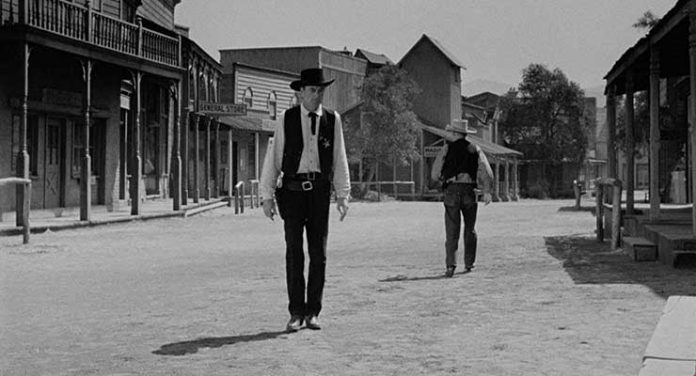![High Noon [Masters of Cinema] Blu-ray Packshot](httpss://www.theaterbyte.com/wordpress/storage/2019/09/eka70343_highnoon_3d_box-post-insert.jpg)
Meant to retire as the town marshal and go away on his honeymoon, Kane gets word that the Miller gang, whose leader Frank (Ian MacDonolad) Will had put away for murder, is actually heading into town on the noon train. At first Will and Amy start out of Hadleyville, but Will’s pride won’t let him abandon his duty and his town without facing down Frank and his cronies once and for all. The problem is, when Will asks for deputies to help him fight off the Millers, he finds himself abandoned by a bunch of yellow-bellied townsfolk who seem more interested in pointing blame around and having long discussions about why the town is facing danger than actually lifting a finger to help the marshal that kept them safe for so many years. His Chief Deputy Harvey Pell (Lloyd Bridges) is envious of Will’s job and covets his ex-mistress, the (Katy Jurado); the town’s former marshal Martin Howe (Lon Chaney) is now an aged drunkard who can’t even lift a gun, and even his wife Amy buys a ticket on the noon train out of town so as not to be around when the fighting starts. Eventually, Will must make his way to the town square for a showdown with the Miller gang and fate, alone, but
The film is shot in real time, so its eighty-five-minute runtime ticks down with an intense sense of realism paced in the actual timeframe in which the story takes place that is heightened by the use of tight camera work and the persistent symbol of a clock ticking down. High Noon was caught up in the red scare McCarthyism of the 1950s. Writer Carl Foreman, whose blacklisting was only temporarily spared by rabid anti-communist Gary Cooper, would fall to the blacklist of the House Un-American Activities Committee. John Wayne, who ironically accepted Cooper’s Oscar award in absentia for his role in High Noon, said the film was the most un-American western he’d ever seen, and director Howard Hawks, another right-wing Hollywood anti-communist hated High Noon so much, he felt compelled to “answer” it with his own film, Rio Bravo. Despite all the shocked sentiments from the anti-communists, High Noon has gone on to be one of the most lauded and enduring westerns ever filmed.
Also ironic is the fact that the story’s protagonist, Will Kane, plays out in fiction the story of the isolated and abandoned hero who must resist oppressive forces, a story that directly mirrors that of writer Carl Foreman’s real-life tribulations during the blacklist era.
[envira-album id=”119528″]
The Video
This Masters of Cinema Series Blu-ray release of High Noon is taken from a 4K restoration and provided in a 1.37:1 AVC 1080p encodement. The film was previously released in the U.S. on Blu-ray in a 4K restoration from Olive’s Olive Signature imprint, which I also reviewed. I compared both releases and they seem to be taken from the same master. There’s a scene very early on in the first act where the bad guys are first riding into town down the main street and a group of the town’s men gather outside a storefront – in the very upper right hand corner of the screen there is some very visible roughness like noise or source damage in the sky in the background. That appears in both releases.
That said, just as with the Olive release, this Masters of Cinema release looks gorgeous. It’s clean and mostly crisp apart from a few frames here and there with some softness probably due to duping for visual effects. The black and white cinematography looks gorgeous, the film grain is beautiful and organic, thinly layered and mostly consistent, blacks are inky without crushing. The textures throughout are breathtaking. One can spot every bit of stubble on the faces of Gary Cooper and Lloyd Bridges.
The Audio
The original monaural audio mix is provided in LPCM 2.0. There isn’t much dynamic range, but dialogue is clear and there’s no clipping and little hiss.
The Supplements
Two excellent audio commentaries, a couple of archival making-ofs, and an archival audio inrterview with Fred Zinnemann are the cherry on top of a superb release.
- Audio commentary by historian Glen Frankel
- Audio commentary by western authority Stephen Prince
- Interview with Neil Sinyard, Author of Fred Zinnemann: Films of Character and Conscience (1.78:1; 1080p; 24 mins.)
- Carl Foreman Interview (feature-length) – Audio interview from 1969 recorded at the National Film Theatre in London
- Inside ‘High Noon’ (1.33:1; 1080i/60; 50 mins.) – An in-depth look at the making of the film
- The Making of ‘High Noon’ (1.33:1; 1080i/60; 22 mins.) – A documentary on the film from 1992 hosted by film critic Leonard Maltin features interviews with Fred Zinnemann
- Behind ‘High Noon’ (1.33:1; 1080i/60; 9 mins. ) – A behind-the-scenes look at High Noon produced in 2002 for the film’s 50th anniversary
- Trailer (1.37:1; 1080p)
- Presented with a Limited Edition 100-page Collector’s Book and Limited-Edition Hardbound Slipcase [3000 copies] ONLY
- The booklet contains a new essay on the film by Philip Kemp, the original short story “The Tin Man” by John W. Cunningham (1947), which High Noon was very loosely based on, and more.
The Final Assessment
From its stark black and white cinematography to its steely hero of determined convictions and real-time story arc, High Noon was an innovative film that spanned a few genres, — western, drama, thriller, action, even noir. Eureka has once again delivered a classic in a beautiful package with wonderful image quality in their Masters of Cinema Series with this release.
High Noon is out on Blu-ray in the UK 16 September 2019 on Eureka Entertainment’s Masters of Cinema Series
Be the first to leave a review.


